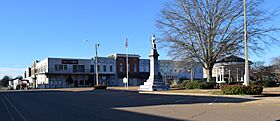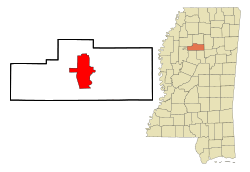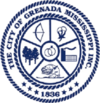Grenada, Mississippi facts for kids
Quick facts for kids
Grenada, Mississippi
|
|||
|---|---|---|---|
| City of Grenada | |||

Downtown Grenada
|
|||
|
|||

Location in Grenada county and Mississippi
|
|||
| Country | |||
| State | |||
| County | Grenada | ||
| Districts | 1, 2, 3, 4, 5 | ||
| Incorporated | February 27, 1836 | ||
| Named for | Granada, Spain | ||
| Government | |||
| • Type | Council–Manager | ||
| Area | |||
| • Total | 30.03 sq mi (77.78 km2) | ||
| • Land | 30.01 sq mi (77.72 km2) | ||
| • Water | 0.03 sq mi (0.06 km2) | ||
| Elevation | 213 ft (65 m) | ||
| Population
(2020)
|
|||
| • Total | 12,700 | ||
| • Density | 423.23/sq mi (163.41/km2) | ||
| Time zone | UTC−6 (Central (CST)) | ||
| • Summer (DST) | UTC−5 (CDT) | ||
| ZIP codes |
38901-38902
|
||
| Area code(s) | 662 | ||
| FIPS code | 28-29460 | ||
| GNIS feature ID | 0670734 | ||
Grenada (pronounced "gruh-NAY-duh") is a city located in Grenada County, Mississippi, United States. It was founded in 1836. According to the 2020 census, about 12,700 people live there. Grenada is also the county seat, meaning it's the main town where the county government is located.
Contents
History of Grenada
Founding and Early Growth
Grenada was created in 1836. It was formed when two smaller towns, Pittsburg and Tulahoma, joined together. These towns were started by Franklin Plummer and Hiram Runnels. The area was once home to Native American communities.
Early on, stores and businesses grew to support the local court and market days. Cotton farms, known as plantations, were developed along the Yazoo River. These farms relied on the forced labor of enslaved African Americans.
Education in the Past
In 1851, the people of Grenada started a school for young white women called the Yalobusha Baptist Female Institute. Later, in 1882, a different church group, the Methodists, took over the school and renamed it Grenada College. It became a junior college in the 1900s. However, it faced money problems during the Great Depression and closed in 1936.
Civil War Period
During the American Civil War, in December 1862, a Confederate general named Earl Van Dorn was in Grenada. He led his soldiers from Grenada to try and destroy a Union army supply base in Holly Springs, Mississippi.
Civil Rights Movement in Grenada
In the 1960s, many African Americans in Mississippi worked to gain equal rights. New laws were passed in 1964 and 1965 to end segregation (keeping people of different races separate) and protect voting rights.
In 1966, James Meredith began a "March Against Fear" to encourage African Americans to register to vote. His march went through Grenada. When Meredith was injured, other important leaders like Martin Luther King Jr. and Dick Gregory continued the march.
They stayed in Grenada for about a week. During this time, local officials seemed to help, and police protected the marchers. The city even hired six black voter registrars, who helped 1,000 black residents register to vote. However, after the march left, these registrars were fired, and the new voters' names were not officially added to the lists. People had to try again to register.
From 1966 to 1967, the Southern Christian Leadership Conference (SCLC) worked in Grenada. They helped people register to vote and tried to get local businesses to hire African Americans. Many places were still segregated, even though segregation laws were no longer legal.
Geography of Grenada
Grenada is located on the south side of the Yalobusha River. A large human-made lake, Grenada Lake, is also very close to the city. The United States Army Corps of Engineers manages Grenada Lake.
The city covers about 30.0 square miles (78 km2) of land. Only a very small part, about 0.03%, is water.
Population Information
| Historical population | |||
|---|---|---|---|
| Census | Pop. | %± | |
| 1870 | 1,887 | — | |
| 1880 | 1,914 | 1.4% | |
| 1890 | 2,416 | 26.2% | |
| 1900 | 2,568 | 6.3% | |
| 1910 | 2,814 | 9.6% | |
| 1920 | 3,402 | 20.9% | |
| 1930 | 4,349 | 27.8% | |
| 1940 | 5,831 | 34.1% | |
| 1950 | 7,388 | 26.7% | |
| 1960 | 7,914 | 7.1% | |
| 1970 | 9,944 | 25.7% | |
| 1980 | 11,508 | 15.7% | |
| 1990 | 10,864 | −5.6% | |
| 2000 | 14,879 | 37.0% | |
| 2010 | 13,092 | −12.0% | |
| 2020 | 12,700 | −3.0% | |
| U.S. Decennial Census | |||
Population Makeup in 2020
The 2020 United States census counted 12,700 people living in Grenada. There were 5,100 households and 2,988 families.
The table below shows the different racial groups living in Grenada:
| Race | Number of People | Percentage |
|---|---|---|
| White (not Hispanic) | 4,799 | 37.79% |
| Black or African American (not Hispanic) | 7,293 | 57.43% |
| Native American | 8 | 0.06% |
| Asian | 67 | 0.53% |
| Other/Mixed | 344 | 2.71% |
| Hispanic or Latino | 189 | 1.49% |
Education in Grenada
Schools in the Past
Before 1966, schools in Grenada were segregated. This meant black children and white children went to separate schools. In 1966, a "freedom of choice" plan was introduced. This allowed black students to attend schools that were previously only for white students.
However, some white people gathered outside the schools to try and stop black students from entering. They even attacked young children as they left school. Because of this, parents started the Grenada Educational Foundation, which is now called Kirk Academy. This school offered an alternative to integrated education.
Modern Education Options
Today, the Grenada School District serves students in Grenada and Grenada County. The city is also home to the Grenada Campus of Holmes Community College. This college campus opened in 1985 and offers college courses, technical training, and job skills programs.
Since 2008, Holmes Community College has worked with the University of Mississippi (often called Ole Miss). They offer a "2+2 program" at the Grenada campus. This means students can complete their first two years of college at Holmes and then transfer to Ole Miss to finish their four-year bachelor's degree.
Notable People from Grenada
- Phillip Alford, actor
- Chris Avery, football player
- Genard Avery, football player
- Pete Boone, athletic director
- E.L. Boteler, politician and businessman
- Big George Brock, blues singer and harmonica player
- Ace Cannon, musician
- Kristian Dambrino, singer, songwriter, and Miss Mississippi 2005
- Walter Davis, blues musician
- Emmanuel Forbes, football player
- Jake Gibbs, baseball player, All American football player
- George Robert Hightower, educator
- Mississippi John Hurt, country blues singer and guitarist
- M. D. Jennings, football player
- Trent Lott, U.S. senator
- John Marascalco, songwriter
- Jim Miles, baseball player
- Dave Parker, Hall of Fame baseball player
- Ike Pearson, baseball player
- Tyre Phillips, football player
- Freeman Ransom, lawyer, businessman, and civic activist
- Greg Robinson, football player
- Magic Sam, blues musician
- Joseph D. Sayers, 22nd Governor of Texas
- Magic Slim, blues musician
- Homer Spragins, baseball player
- Trumaine Sykes, football player
- Donna Tartt, author
- Edward C. Walthall, United States senator
- Howard Waugh, Canadian football player and humanitarian
- Luke J. Weathers (1920–2011), former Tuskegee Airmen
- Eddie Willis, member of Funk Brothers
- William Winter, governor of Mississippi (1980-1984)
- Charlie Worsham, country singer, musician, and songwriter
- Frank Wright, jazz musician
Images for kids
See also
 In Spanish: Grenada (Misisipi) para niños
In Spanish: Grenada (Misisipi) para niños
 | Jessica Watkins |
 | Robert Henry Lawrence Jr. |
 | Mae Jemison |
 | Sian Proctor |
 | Guion Bluford |







